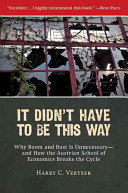
FGF E-Package
From Under The Rubble
February 28, 2013

Fireside Reading
by Christopher Manion
fitzgerald griffin foundation
FRONT ROYAL, VA — Traveling through the intersection of religion and economics is often a very rough ride, and it features a high collision rate. Countless influential religious folks, both lay and clerical, insist on writing about economics, only to demonstrate their well-intentioned ignorance (or perhaps their ill-intentioned ideologies). Many economists, on the other hand, consider religion something they have to put up with, or to deny altogether, in order to make their "systems" work.It's a rare breed that takes pains to study both realms. The overriding virtue demanded by such an effort is not intelligence, but humility. Today, economists are more likely to defer to a juicy algorithm than to human freedom. The economist confronts a powerful temptation to believe that people's lives would be better if they lived them his way. A similar temptation plagues those in the realm of religion. At one time or another, we have all been trapped in the middle of the pew as the preacher launches into a political tirade. His duty might be to defend the faithful's freedom to do God's Will, but instead he somehow finds that the salvation requires our acquiescence to his political agenda.
Dr. Harry Veryser, of the Department of Economics at the University of Detroit Mercy, has his feet on solid ground in both realms. A successful businessman and an educated Catholic, he has both practical and intellectual experience that informs this work that is helpful in so many ways.
"This book is an effort to tell the story of the modern economic condition, which began about 150 years ago," writes Veryser. His goal — which he achieves masterfully — lies in both investigating and understanding the disasters that bad economics has wrought over the years, and learning from them.
"This book is an effort to tell the story of the modern economic condition, which began about 150 years ago," writes Veryser. His goal – which he achieves masterfully — lies in both investigating and understanding the disasters that bad economics has wrought over the years, and learning from them. The unique gift he brings to this effort is his understanding of man — an understanding flowing from his study of Aristotle and Aquinas and, therefore, an understanding that respects human freedom as well as the limits of power.
On that solid ground, Veryser invites the reader to consider economic questions not an arsenal of abstract mathematical formulations, but with a firm grip on reality. "If there is a bright spot in the recent economic crisis," he writes almost cheerfully, "it is this: people everywhere are giving much more serious thought to foundational questions about the economy. What caused our woes, and more important, how can we prevent future calamities?"
As Sherlock Holmes said to Watson, "Watson, when I say you are instructive, I mean I learn from your mistakes."
The Hundred Years War On Freedom
Robert Nisbet once observed that in 1913, the year he was born, the only contact that the average US citizen had with the federal government was the Post Office. For Veryser as well, 1913 was a pivotal year. "Before World War I," he writes," government based public policy on so-called classical economic theories about money and trade." But that quickly changed, as reality-based economic policy quickly gave way to revered abstractions and their constant companion, government power.
One seldom hears an economist cite Aristotle's dictum that a science can be only as exact as its subject matter permits. Human beings are not equilateral triangles. Veryser recounts how, for the last hundred years, several generations of self-appointed whiz kids routinely manipulated the political economy, causing the "boom and bust cycle" and making the 1913 dollar worth one penny today.
Oh — and they never apologized.
Veryser presents a lucid look at the age of classical liberalism and the rise of the Austrian School of Economics, in a fashion that is both appealing and understandable to the generalist. He continually emphasizes principles that are not derived from imaginative rumination, but from real life — the rule of law, limited taxation and economic freedom, free trade, and a metallic-based currency.
There are some insightful raisons in the cake, such as A.J.P. Taylor's classic quotation from Bismarck: "Whoever has a pension for his old age is far more content and far easier to handle than one who has no such prospect. Look at the difference between a private servant and a servant in the Chancellery Court; the latter would put up with much more, because he has a pension to look forward to."
Words for budding tyrants to live by.
Budding tyrants also prefer war to peace, and Veryser contrasts Pope Benedict XV, who championed an early peace after World War I broke out, to Woodrow Wilson, one of several US presidents who were elected on a platform of peace but took the country to war, and to ruin. "And so the age of classical liberalism, which began in 1815 with the Congress of Vienna, ended in 1919 with the Treaty of Versailles," Veryser observes.
The Tenth Amendment And The Tenth Commandment
The tenth chapter, "Cornerstones of Prosperity," is worth the price of the book. The "cornerstones" are familiar: private property, a sound currency, the rule of law, the sacredness of contracts, among others. But Veryser also elucidates unfamiliar but equally indispensable elements of a free society — a sound family structure, the common good, and leisure — essential ingredients which are seldom seen in the work of economists. He also points to an insidious vice, the engine of socialism and a poisonous enemy of freedom: envy. Veryser also elucidates unfamiliar but equally indispensable elements of a free society — a sound family structure, the common good, and leisure — essential ingredients which are seldom seen in the work of economists. He also points to an insidious vice, the engine of socialism and a poisonous enemy of freedom: envy. The principle of subsidiarity deserves special mention: "It holds that the smallest, least centralized units of society are best equipped to handle most of the work that society gets done." Veryser's treatment of this vital principle cannot be easily condensed, but it raises an important point.
The principle of subsidiarity has been articulated well by the Catholic Church in recent years, but many American progressives insist that it poses no impediment to their agenda because the problems they desire to address have not been adequately resolved by the states and smaller communities.
Two points arise. First, meddling progressives are given to call everything a "problem" — which assertion, if conceded, gives them the authority to "solve" it. They fail to distinguish between a problem, which has a solution, and a condition, which does not. This defies Aristotle's admonition to humility (which is resonated in Sirach 3:18 — "Humble yourself, the greater you are, and you will find favor with God"). Their reckless tampering not only offends basic human freedoms, but it also invariably brings on failure, which they then insist requires more progressive wrecking crews.
Second, Veryser points to the Tenth Amendment as an affirmation of this principle, which it is; but there is a profound distinction: in the Church, a genuine problem that cannot be solved locally can theoretically rise beyond the local bishop to the pope. Under the Constitution, however, even if a state does not address a problem in a manner that satisfies the progressive, the Federal Government is not authorized to act unless that action is allowed by the powers expressly enumerated in the Constitution.
All in all, Veryser stands out among his peers as a man who is comfortable with philosophy, theology, economics, history, and politics, and the result is a welcome and informative read.
From Under the Rubble archives
From Under the Rubble is copyright © 2013 by Christopher Manion. All rights reserved.
Christopher Manion is Director of the Campaign for Humanae Vitae™, a project of the Bellarmine Forum. He
served as a staff director on the Senate Foreign Relations Committee for many years. He has taught in the departments of politics, religion, and international relations at Boston University, the Catholic University of America, and Christendom College. This column is sponsored by the Bellarmine Forum.
See a complete biographical sketch.
To subscribe or donate to the FGF E-Package online or send a check to:
P.O. Box 1383
Vienna, VA 22183
© 2013 Fitzgerald Griffin Foundation
